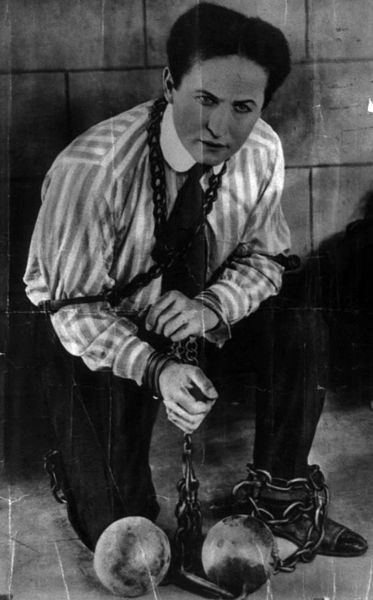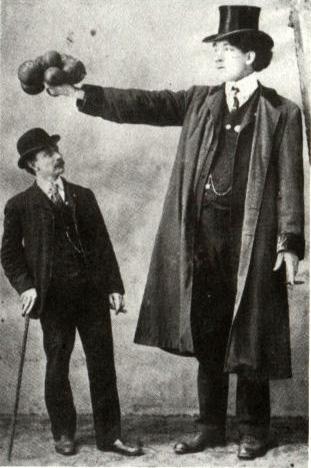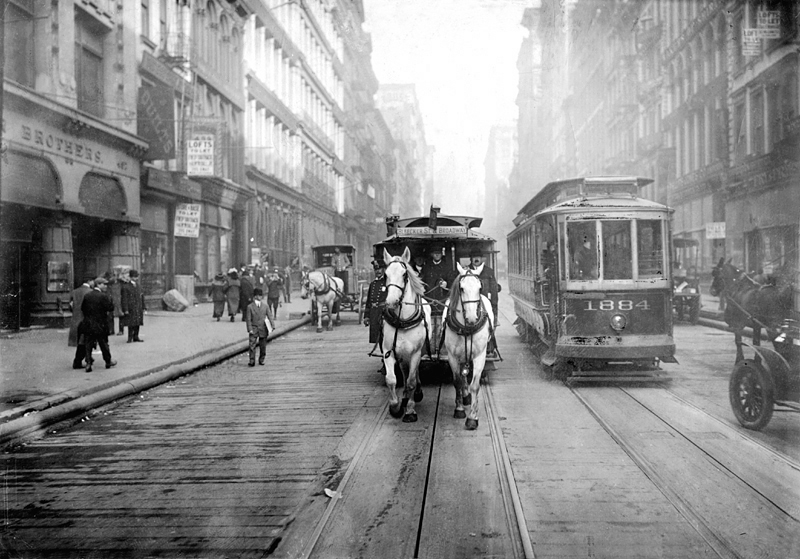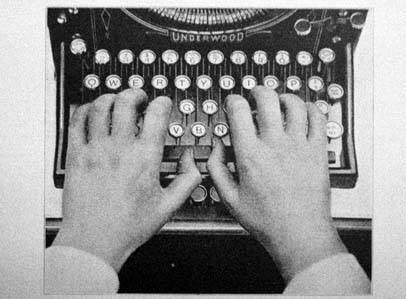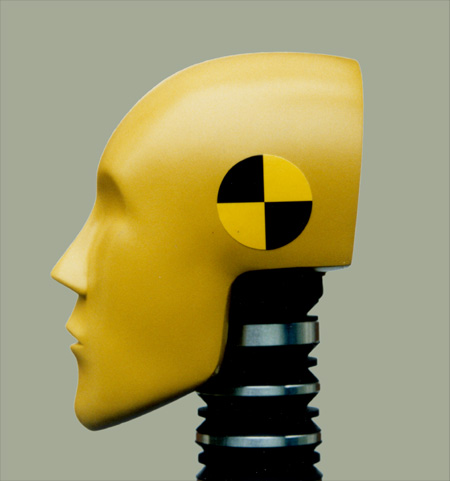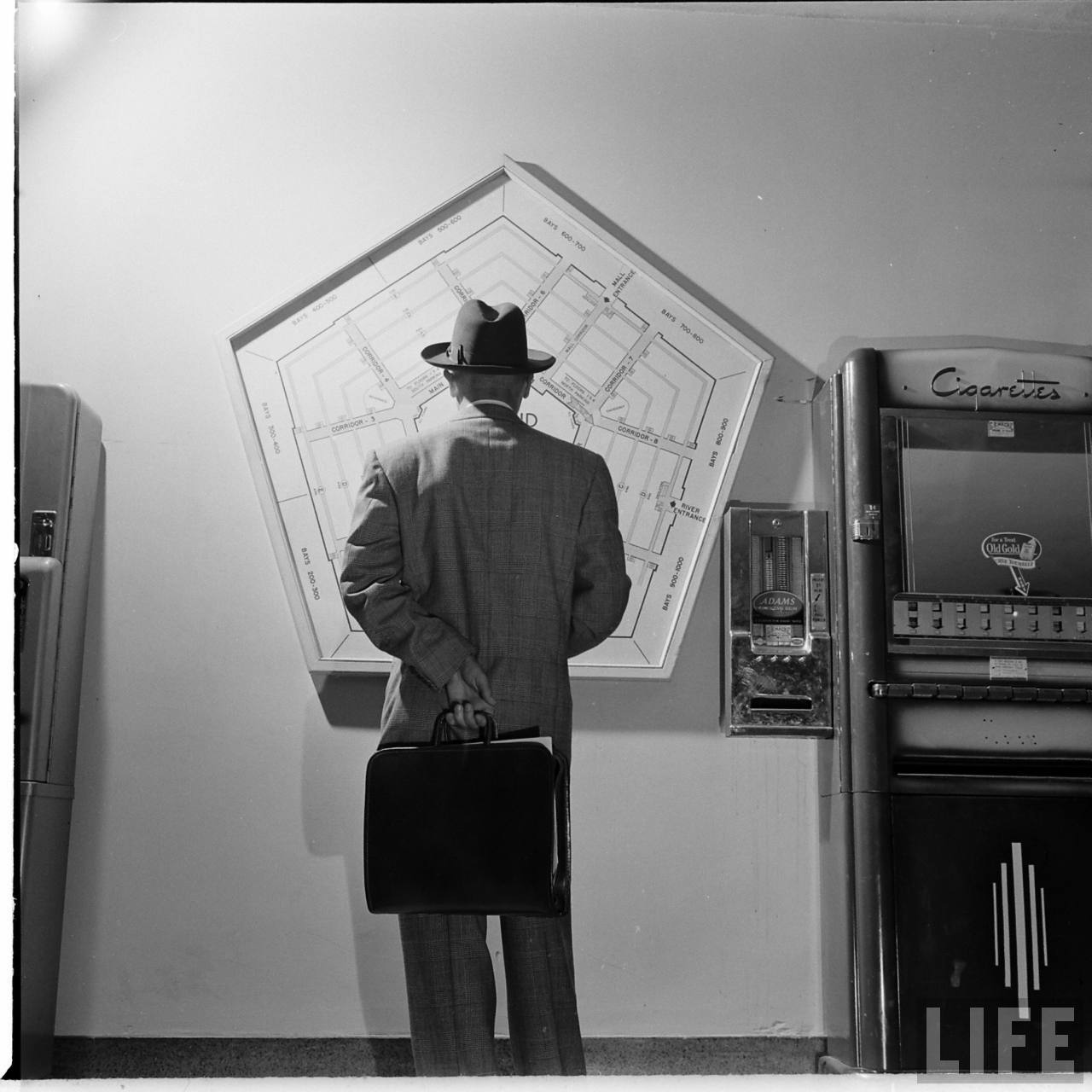A metallic exoskeleton suit intended for workers in nuclear plants.
You are currently browsing the yearly archive for 2011.
Here is a cool artifact of Harry Houdini, courtesy of kottke.org. It’s audio from a 1914 wax cylinder that Edison made of the master of escape. In the clip, Houdini describes his Water Torture Cell trick.
If you’re unfamiliar with Jason Kottke and his site, he’s one of the original bloggers and has been serving up intelligent posts since before most people heard of the word “blog.” Everyone who came after and tried to do something smart in the format owes him a debt. To learn more about his early days as a blogger, have a look at this 2000 New Yorker piece by Rebecca Mead (subscription required).
••••••••••
More Harry Houdini posts:
Tags: Harry Houdini, Jason Kottke, Rebecca Mead, Thomas Edison
Wanted – Santa Claus Letters – $1 (New York)
Hello, I”m collecting data for research and need to collect letters to Santa Claus from children living in New York. I am a licensed Psychologist in Nevada. The U.S. Postal Service will not help me (because once they are dropped in the mail, they become property of the U.S.P.S). The letters do not need to have any identifying information. You don’t even need to put a return address. Just make sure it has the city and State, and if you want, the area of the city. The letters may be used for my research project and therefore this statement serves as consent to use it. P.S. I’m looking for funny, cute, unique, sad, etc. If you want more information feel free to contact me through craigslist.
Hard science was not evident anywhere in this odd January 5, 1890 Brooklyn Daily Eagle article which suggested that men were willing themselves to be taller. Or maybe this was supposed to be funny? I don’t think so. An excerpt from the article, which originally appeared in the Chicago Times:
“Mr. Edward Atkinson, of Boston, finds time while conducting an extensive business to collect information on a great variety of subjects. He has lately ascertained, by means of circulars addressed to leading tailors, the makers of ready made clothing and the manufacturers of underclothes, that the men of this country are growing taller decade by decade. He thinks we shall eventually become a nation of giants. As yet he has elaborated no theory to account for this steady increase in height. Some physiologists, however, have suggested that it is due to the large consumption of meat in this country. The state that people who, like the Chinese and Hindus, subsist almost entirely on grain and fruit, are invariably short in stature, while flesh consumers, like the North American Indians, are generally quite tall.

"The man who invests $3 in tickets for the purpose of taking his best girl to the theater finds that he can see nothing on the stage unless he happens to be very tall."
It is likely that diet may have something to do in influencing the height men may attain. But it is obvious that there are other causes that exert a much greater influence. There are a great many inducements held out in this country for men to become tall. Nearly every boy desires to gain admission to the military or naval academy, and each learns as soon as he can read that it is necessary to reach a certain standard of height in order to be eligible. Men must also stand a certain number of feet and inches in their stockings before they can attain positions on the police force in most cities. As premiums are offered for becoming tall, it is by no means wonderful that men and boys should seek to add to their figure by taking thought or taking anything that will produce the desired result.
The introduction of the three story roof bonnet has been a most important agent in enlongating the spinal column of men. The man who invests $3 in tickets for the purpose of taking his best girl to the theater finds that he can see nothing on the stage unless he happens to be very tall. As a consequence men who attend theaters and operas make use of every means that will enable them to become tall. In some fashionable churches the male worshiper of medium height has no opportunity to see the minister or the pretty soprano singer. The Tower of Babel bonnets, surrounded by fowls of the air and lilies of the field, entirely obstruct his view.
The street car also exerts great influence in causing men to become tall. They generally give the seats to the women and are obliged to stand during the entire trip. As soon as a boy is 12 years old his endeavors to reach the strap attached to the top rail commence. He perseveres in this attempt until he succeeds in accomplishing the difficult feat. He learns to stretch his body out in the same way that an earthworm does to reach a certain place. After he has availed himself of all his powers of self elongation, certain agencies that are not voluntary are brought to work on his body. Side pressure is made to bear on it as if it is on a bar of iron that is to be drawn out into wire. It also receives numerous blows every time the car wheels pass over an obstruction, and these produce the same effect of the body that the blow of a hammer do a piece of soft iron.”
Tags: Mr. Edward Atkinson
In addition to numerous others things, the rise of personal computers killed off the concept of World’s Fairs, at least in America. People used to descend on them by the millions to be wowed by inventions, technology and cultures they couldn’t experience in their workaday lives. But who needs to drive hundreds or thousands of miles to be awed now? What’s the sense of going anywhere to be connected to crowds of other people? It’s all possible now 24 hours a day on tiny screens in our pockets.
The final World’s Fair in the U.S. was the 1984 one in New Orleans, which declared bankruptcy. There were financial problems all along, so perhaps it would have been a boondoggle regardless. But it was also just a sign of the times, the end of an era. A 60 Minutes report about the New Orleans fiasco:
Technology enables a phenom’s talent in Alex Pappademas’ smart New York Times Magazine piece about the ascent of a young rap producer who works under the name “Lex Luger.” Even if you don’t like hip-hop, the subject and the storytelling are really compelling, capturing a young artist reflecting in the moment after the arrival of great fame. The opening:
“A few years ago, before anyone knew his name, before rap artists from all over the country started hitting him up for music, the rap producer Lex Luger, born Lexus Lewis, now age 20, sat down in his dad’s kitchen in Suffolk, Va., opened a sound-mixing program called Fruity Loops on his laptop and created a new track. It had a thunderous canned-orchestra melody, like an endless loop of some bombastic moment from Wagner or Danny Elfman; a sternum-rattling bass line; and skittering electronic percussion that brought to mind artillery fire. When the track was finished, he e-mailed it to a rapper named Waka Flocka Flame. Luger had recently spent a few months in Atlanta with Waka, sequestered in a basement, producing most of the music for Waka’s debut album. Waka had asked him for one more beat, one that could potentially be the album’s first single.
Months later, Luger — who says he was ‘broke as a joke’ by that point, about to become a father for the second time and seriously considering taking a job stocking boxes in a warehouse — heard that same beat on the radio, transformed into a Waka song called ‘Hard in da Paint.’ Before long, he couldn’t get away from it.”
••••••••••
“Hard in da Paint”:
Tags: Alex Pappademas, Lex Luger, Lexus Lewis
Stupendously idiotic, the Intimacy 2.0 line of dresses, made by Dutch designers, become sheerer when a wearer is excited by a potential mate. (Thanks Fastcodesign.)
Some search engine keyphrases bringing traffic to Afflictor this week:
- Old Print Articles: Everyone who works at Bellevue Hospital is drunk (1901) + Bad grandma has bad descendants (1902).
- Featured Videos: Peter Sellers TV appearances (1970/73) + Petman robot is scary, amazing + Test flight of a hybrid zeppelin + Furby torments Siri + Carl Sagan meditates on the moon landing’s significance + Hans Rolsing explains world population using Ikea products + Charles Kuralt reports on the postal service (1981) + Charles Kuralt visits a Texas turkey trot (1972) + Charles Kuralt recalls murdered missionaries (1976) + Neil Postman anazlyzes the new technology (1995) + Criswell predicts the future (1965) + Woody Allen interviews Billy Graham (1970) + Woody Allen hosts the Tonight Show (1971) + Marshall McLuhan worries about information overload (1977) + Tom Snyder is awed by holography (1977).
- Recently posted on NYC’s Craigslist: I don’t like driving to illegal poker games + I can’t tolerate being alone with me, but perhaps you can + I miss NYC so much that I constantly get high.
- Microsoft predicts the advent of “data spill” by 2019.
- William Gibson explains how the future will change history.
- In 1966, Timothy Leary predicts how LSD users would change the world.
- Jack Nicholson recalls his first LSD experience.
- Steven Johnson reacts to the new Steve Jobs bio.
- Steve Jobs hated the Sports Illustrated tablet mock-up.
- E.B. White mourns the decline of the Model T in 1936,
- Filmmaker Ilya Khrzhanovskiy runs wild in a great article by Michael Idov.
- Samuel Arbesman tries to figure out how long America will last.
- Dropping cheap laptops out of helicopters in remote villages.
- Companies creating wireless charging for electric cars.
- Nabokov had a low opinion of Dostoyevsky.
- A 1995 Wired piece about the positive side of a lack of privacy.
- How merely walking through the door affects your memory.
- Robots want to take even more of your jobs,
- Can the brain be rewired so that spenders become savers?
- Architect Bjarke Ingels aims for large-scale urban creations.
- Tyler Cowen and Kevin Grier explain why sports labor disputes are so odd.
- A look back at Kurt Vonnegut’s odd life and bitter end.
- Jesse McKinley takes a jaunt through Death Valley.
- Afflictor Nation: Great Britain rules in October.
- This week’s Afflictor keyphrase searches.
Interesting, though I have no way of confirming or refuting these figures. From SmartPlanet:
“In two years there will be 1.2 million robots working on Earth, that is one robot per 5,000 humans. As of 2010, there are 34 robots working per 1,000 people in Japan (see info graphic below fromFocus and the World Robotics report.) It is estimated that by 2025 robots will have taken over a whopping half of all jobs in the U.S. The hardest hit industries are predicted to be: manufacturing, automotive and food services.”
It was in the 1970s that control of media and information began its migration to the hands of the individual, and people became excited about new tech toys, even ones that tha weren’t particularly awesome, like CB radios. In 1977, Tom Snyder and friends tout the wonders of holography.
Tags: Tom Snyder
Ilya Khrzhanovskiy’s 4, one of my favorite films of the aughts, was almost indescribably odd. Stranger still, is the follow-up, or the production of it, which has been filming for five years and counting in a Ukranian town, and resembles more a totalitarian state driven by the type of hubris that Herzog and Coppola brought to the jungle, than a mere movie. The opening of Michael Idov’s great GQ article, “The Movie Set That Ate Itself“:
“The rumors started seeping out of Ukraine about three years ago: A young Russian film director has holed up on the outskirts of Kharkov, a town of 1.4 million in the country’s east, making…something. A movie, sure, but not just that. If the gossip was to be believed, this was the most expansive, complicated, all-consuming film project ever attempted.
A steady stream of former extras and fired PAs talked of the shoot in terms usually reserved for survivalist camps. The director, Ilya Khrzhanovsky, was a madman who forced the crew to dress in Stalin-era clothes, fed them Soviet food out of cans and tins, and paid them in Soviet money. Others said the project was a cult and everyone involved worked for free. Khrzhanovsky had taken over all of Kharkov, they said, shutting down the airport. No, no, others insisted, the entire thing was a prison experiment, perhaps filmed surreptitiously by hidden cameras. Film critic Stanislav Zelvensky blogged that he expected ‘heads on spikes’ around the encampment.
I have ample time and incentive to rerun these snatches of gossip in my head as my rickety Saab prop plane makes its jittery approach to Kharkov. Another terrible minute later, it’s rolling down an overgrown airfield between rusting husks of Aeroflot planes grounded by the empire’s fall. The airport isn’t much, but at least it hasn’t been taken over by the film. And while my cab driver knows all about the shoot—the production borrowed his friend’s vintage car, he brags without prompting—he doesn’t seem to be in the director’s thrall or employ.
I’m about to write the rumors off as idle blog chatter when I get to the film’s compound itself and, again, find myself ready to believe anything. The set, seen from the outside, is an enormous wooden box jutting directly out of a three-story brick building that houses the film’s vast offices, workshops, and prop warehouses. The wardrobe department alone takes up the entire basement. Here, a pair of twins order me out of my clothes and into a 1950s three-piece suit complete with sock garters, pants that go up to the navel, a fedora, two bricklike brown shoes, an undershirt, and boxers. Black, itchy, and unspeakably ugly, the underwear is enough to trigger Proustian recall of the worst kind in anyone who’s spent any time in the USSR. (I lived in Latvia through high school.) Seventy years of quotidian misery held with one waistband.
The twins, Olya and Lena, see nothing unusual about this hazing ritual for a reporter who’s not going to appear in a single shot of the film—just like they see nothing unusual in the fact that the cameras haven’t rolled for more than a month. After all, the film, tentatively titled Dau, has been in production since 2006 and won’t wrap until 2012, if ever. But within the walls of the set, for the 300 people working on the project—including the fifty or so who live in costume, in character—there is no difference between ‘on’ and ‘off.'”
Tags: Ilya Khrzhanovskiy, Michael Idov
I recall reading somehwere that Kurt Vonnegut had co-written a screenplay with the odd comedian Steven Wright. The script was unproduced, and I imagine Wright still has it. Anyhow, there’s a new biography of Vonnegut, by Charles J. Shields, which examines the many contradictions of the novelist’s life and his bitter later years. From Janet Maslin’s New York Times piece about the book:
“Mr. Shields is not shy about using the words ‘a definitive biography of an extraordinary man’ to describe his book. And So It Goes is quick to trumpet its biggest selling points. Mr. Shields means to separate image from perception: He depicts Vonnegut as an essentially conservative Midwesterner, proud of his German heritage and capitalist instincts, who developed an aura of radical chic. He also describes a World War II isolationist who aligned himself with Charles A. Lindbergh yet became an antiwar literary hero. And he finds a life-affirming humanist sensibility in a writer celebrated for black humor. How this man would eventually be recruited to brainstorm with the Jefferson Airplane and be hipper than his own children are among the mysteries on which Mr. Shields casts light.
And So It Goes also traces the paradoxes in Vonnegut’s personal life. He was widely regarded as a lovable patriarch, for instance, at a time when he had left his large family behind. He also sustained a populist reputation even when he developed a high social profile in New York with the photographer Jill Krementz, his second wife. Ms. Krementz, who is called ‘hard-wired to the bowels of hell’ by Vonnegut’s son, Mark, clearly did not cooperate with Mr. Shields. The book takes frequent whacks at her, holding her accountable for much of the unhappiness in Vonnegut’s last years.
Mr. Shields provides a good assessment of misconceptions about Vonnegut’s writing. Those impressions persisted throughout his later life, perhaps because the books that followed Cat’s Cradle, The Sirens of Titan, God Bless You, Mr. Rosewater and Slaughterhouse-Five became increasingly unreadable.
‘On the strength of Vonnegut’s reputation, Breakfast of Champions spent a year on the best-seller lists,’ Mr. Shields writes of that 1973 disappointment, ‘proving that he could indeed publish anything and make money.'”
••••••••••
“Hey, Kurt, you read lips?”:
Steve Jobs looked at a mock-up tablet version of Sports Illustrated in 2009–roughly six months before he unveiled the iPad–and was his usual charming self in evaluating it. From Mediabistro:
“The demo was impressive, especially considering the Apple iPad would not be unveiled for another half a year. Unfortunately, not everyone was impressed. After Apple unveiled the iPad, Steve Jobs came to Time Inc.’s New York offices and met with the editors of some of their biggest magazines. He was asked what he thought of SI’s demo.
‘I think it is really, really stupid,’ Jobs said. That stung Terry McDonnell, the editor of SI and the Time Inc. sports group.
‘I was sad, and we were all kind of stunned,’ McDonnell said. ‘It was not stupid, in fact it anticipated everything he was doing.'”
Furby taunts Siri.
Carl Sagan’s eloquent meditation on the moon landing’s significance.
Tags: Carl Sagan
One Laptop Per Child, an ambitious and well-intentioned project that seems to have been undercut by the market, has settled on an unusual new means of distribution for its cheap computers. An excerpt from an Ars Technica story:
“The One Laptop Per Child (OLPC) project has devised a bizarre plan for deploying its new XO-3 tablet. The organization plans to drop the touchscreen computers from helicopters near remote villages in developing countries. The devices will then be abandoned and left for the villagers to find, distribute, support, and use on their own.
OLPC founder Nicholas Negroponte is optimistic that the portable devices—which will be stocked with electronic books—will empower children to learn to read without any external support or instruction. The strange scheme reflects the OLPC project’s roots in constructivist education theory, which emphasizes self-directed learning.
The OLPC project was originally founded to produce low-cost education-focused laptops for children. The organization planned to sell the devices in bulk to governments in developing countries, which would then distribute them in classrooms. The plan was to leverage economy of scale in manufacturing to bring the costs down, making the laptop cheap enough that governments would be able to supply one to every child.
Although the ambitious project sold several million laptops, it fell far short of its lofty goals and has been on life support for the past few years.”
From a new Paris Review interview with William Gibson:
“Paris Review: You’ve written that science fiction is never about the future, that it is always instead a treatment of the present.
William Gibson: There are dedicated futurists who feel very seriously that they are extrapolating a future history. My position is that you can’t do that without having the present to stand on. Nobody can know the real future. And novels set in imaginary futures are necessarily about the moment in which they are written. As soon as a work is complete, it will begin to acquire a patina of anachronism. I know that from the moment I add the final period, the text is moving steadily forward into the real future.
There was an effort in the seventies to lose the usage science fiction and champion speculative fiction. Of course, all fiction is speculative, and all history, too—endlessly subject to revision. Particularly given all of the emerging technology today, in a hundred years the long span of human history will look fabulously different from the version we have now. If things go on the way they’re going, and technology keeps emerging, we’ll eventually have a near-total sorting of humanity’s attic.
In my lifetime I’ve been able to watch completely different narratives of history emerge. The history now of what World War II was about and how it actually took place is radically different from the history I was taught in elementary school. If you read the Victorians writing about themselves, they’re describing something that never existed. The Victorians didn’t think of themselves as sexually repressed, and they didn’t think of themselves as racist. They didn’t think of themselves as colonialists. They thought of themselves as the crown of creation.
Of course, we might be Victorians, too.”
•••••••••••
“Just for a minute, it struck me as miraculous”:
Tags: William Gibson
As the U.S. postal system continues its uncomfortable passage into obsolescence, a look back at Charles Kuralt’s 1981 report about a Gap, Pennsylvania, postal worker with a challenging route.
About Kuralt’s shocking secret life, which surfaced after his death, from Salon: “Charles Kuralt, CBS’s folksy ‘On the Road’ correspondent, spent years exploring America’s out-of-the-way places in search of oddball stories. But the best story may have been the one he never told.
For 29 years, until his death in 1997, he apparently kept a mistress and maintained a second family. The celebrated journalist was, in effect, husband and father to them, as well as breadwinner, friend and hero.
While his wife remained at their home in the concrete canyons of New York City, he nurtured his secret life along a rushing trout stream in Montana.
None of this would come out, however, until after his death, when his mistress, Patricia Elizabeth Shannon, sued to get a Montana retreat he promised her. Montana’s Supreme Court ruled last month that the woman is entitled to a trial on her claim.”
Tags: Charles Kuralt
According to a post on Research Digest, human memory is segmented, so walking through a doorway makes it more difficult to remember what occurred in the previous room. An excerpt:
“Like information in a book, unfolding events are stored in human memory in successive chapters or episodes. One consequence is that information in the current episode is easier to recall than information in a previous episode. An obvious question then is how the mind divides experience up into these discrete episodes? A new study led by Gabriel Radvansky shows that the simple act of walking through a doorway creates a new memory episode, thereby making it more difficult to recall information pertaining to an experience in the room that’s just been left behind.
Dozens of participants used computer keys to navigate through a virtual reality environment presented on a TV screen. The virtual world contained 55 rooms, some large, some small. Small rooms contained one table; large rooms contained two at each end. When participants first encountered a table, there was an object on it that they picked up (once carried, objects could no longer be seen). At the next table, they deposited the object they were carrying at one end and picked up a new object at the other. And on the participants went. Frequent tests of memory came either on entering a new room through an open doorway, or after crossing halfway through a large room. An object was named on-screen and the participants had to recall if it was either the object they were currently carrying or the one they’d just set down.
The key finding is that memory performance was poorer after travelling through an open doorway, compared with covering the same distance within the same room. ‘Walking through doorways serves as an event boundary, thereby initiating the updating of one’s event model [i.e. the creation of a new episode in memory]’ the researchers said.” (Thnaks Browser.)
Tags: Gabriel Radvansky
Neil Postman on the creation of information junkies. From 1995.
Tags: Neil Postman
Speaking of Marshall McLuhan, in the 1996 Wired article, “Channeling McLuhan,” Gary Wolf interviewed one of the Canadian media philosopher’s doppelgangers, a shadowy person who posted to a computer mailing list under the McLuhan name. It was an odd gambit, but the exchange elicited a contrarian idea about the invasion of privacy in the digital age, which seems an even more apt point of discussion now. An excerpt:
“Wired: Do you think privacy and anonymity are being eroded in the digital age?
“MM”: Don’t be fooled by ‘anonymity.’ There is no such thing, since every node in a communication system must have an ID. Concerns about privacy and anonymity are outdated. Cypherpunks think they are rebels with a cause, but they are really sentimentalists.
In the ’50s, men were crying about the ‘mass’ man and spilling tears over too much anonymity. And they were right, or more right than the cypherpunks. Factories and corporations gave men roles, not souls. Industrial society was anonymous. Cities, factories, secret ballots with mechanical polling booths – that’s anonymity. The Big Brother bogeyman of the machine age used technology to enforce anonymity and prevent anybody from doing his own thing.
The era of politics based on private identities, anonymous individuals, and independent citizens began with the French Revolution and Napoleon’s armies (a product of the popular press) and ended with Hitler (the product of radio). The cypherpunks are still marching to the same martial music. You think private individuals and mass industrial society are opposites? They are part of the industrial configuration. Instantaneous electronic society gives everybody an identity – which we all want, and which we all also want to lose – while putting almost intolerable pressure on our sense of privacy.
Privacy disappears in the simultaneous stimulation of our patterns of thought.”
Tags: Gary Wolf, Marshall McLuhan
Marshall McLuhan fretting about information overload, back in 1977, when there was a lot less information to be loaded.
Tags: Marchall McLuhan
Vladimir Nabokov, genius writer and avid lepidopterist, was no big Dostoyevsky fan, at least based on the 1964 Playboy Interview that was conducted by future Futurist Alvin Toffler. An excerpt:
“Playboy: Dostoevski, who dealt with themes accepted by most readers as universal in both scope and significance, is considered one of the world’s great authors. Yet you have described him as ‘a cheap sensationalist, clumsy and vulgar.’ Why?
Nabokov: Non-Russian readers do not realize two things: that not all Russians love Dostoevski as much as Americans do, and that most of those Russians who do, venerate him as a mystic and not as an artist. He was a prophet, a claptrap journalist and a slapdash comedian. I admit that some of his scenes, some of his tremendous, farcical rows are extraordinarily amusing. But his sensitive murderers and soulful prostitutes are not to be endured for one moment– by this reader anyway.”

